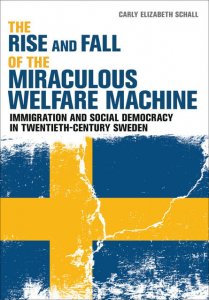Presented By: Germanic Languages & Literatures
The Rise & Fall of the Miraculous Welfare Machine: Immigration and social democracy in 20th century Sweden
Sociologist Elizabeth Carly Schall

For three quarters of a century, Sweden has globally been treated as the quintessential example of the advanced Welfare State. Since the 1960s, Sweden has also experienced a dramatic transformation from a relatively homogeneous nation to a visibly multiethnic society. In recent years, Sweden has been celebrated by many for having Europe’s most generous refugee policies (at least until the crisis of 2015), but also been used as a warning example by others – e.g. by president Trump.
What is the relationship between national identity and ethnic homogeneity on the one hand, and conditions of participation in the benefits of a far-reaching Welfare State, on the other? How has this issue been dealt with during the formation of the Swedish Welfare State and during later crises, when the identity of the “People” of the “People’s Home” has been put into question? What has, in this regard, been the effects of the Social Democrats’ dominant role in Swedish politics?
Such questions are addressed in a recently published book by professor Carly Elizabeth Schall, Purdue University, Indiana.
Free and open to the public; sponsored by the Scandinavian Program of the Department of Germanic Languages and Literatures.
If you are a person with a disability who requires an accommodation to participate in this event, please contact Germanic Languages & Literatures at 734-764-8018 or germandept@umich.edu
What is the relationship between national identity and ethnic homogeneity on the one hand, and conditions of participation in the benefits of a far-reaching Welfare State, on the other? How has this issue been dealt with during the formation of the Swedish Welfare State and during later crises, when the identity of the “People” of the “People’s Home” has been put into question? What has, in this regard, been the effects of the Social Democrats’ dominant role in Swedish politics?
Such questions are addressed in a recently published book by professor Carly Elizabeth Schall, Purdue University, Indiana.
Free and open to the public; sponsored by the Scandinavian Program of the Department of Germanic Languages and Literatures.
If you are a person with a disability who requires an accommodation to participate in this event, please contact Germanic Languages & Literatures at 734-764-8018 or germandept@umich.edu